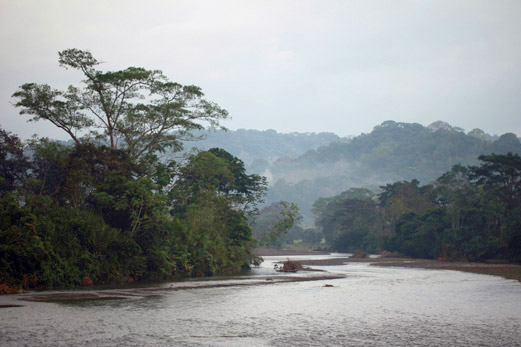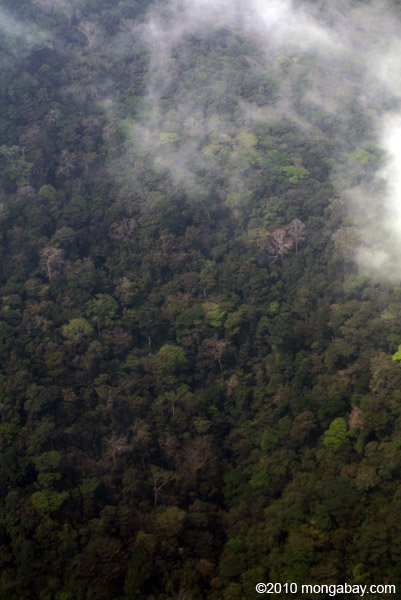
Rainforest in the Choco-Darien. Photo by Rhett A. Butler.
A pioneering project to reduce deforestation and forest degradation in a former conflict zone in Colombia has won gold certification under the Climate, Community, and Biodiversity (CCB) standard. The accreditation will help local communities access carbon finance in their efforts to safeguard biologically-rich forests.
The project is located in Colombia’s Darien region, near the border with Panama. The area is part of the Chocó, the rainforest ecosystem that runs along the Pacific coast of Colombia and Ecuador but has been heavily impacted in places by logging, mining, and clearing for agriculture and cattle ranching. The Chocó ranks as one of the most biodiverse ecosystems on Earth.
The project is led by Anthrotect, which started working with Afro-indigenous and indigenous Embera–Wounaan communities in 2007 after its founder, anthropologist Brodie Ferguson, completed research on the impact of forced displacement in the region. As families returned to their traditional lands after nearly a decade of displacement, the prospect of new conflict between armed land grabbers and communities loomed. Ferguson identified carbon finance as a potential means to help Afro-Colombian and indigenous landowners strengthen their land claims and improve natural resource management.
 Rainforest in the Choco. Photo by Rhett A. Butler. |
“Carbon assets generated through forest stewardship are one the most promising economic alternatives for Afrodescendant and indigenous peoples in Colombia” said Ferguson in a statement. “Our approach to community-based conservation means that, for the first time, forest-dependent communities in the Chocó can generate income from ecosystem services markets while preserving their traditional ways of life.”
Ferguson added that half the project’s profits go to the community, which will also benefit from new employment opportunities from conservation activities and management of the project.
“Our business model is premised on the belief that participating communities are best positioned as equal partners in the project to guarantee durable conservation and financial dividends over the long term,” said Emily Roynestad, Business Development Director at Anthrotect. “The Chocó-Darién Corridor project is an attractive development alternative for Afro-descendant and indigenous landowners in Colombia. It demonstrates the potential for carbon finance to encourage a proactive approach to work for a better future.”
Anthrotect is now seeking certification for its carbon offsets under the Verified Carbon Standard (VCS), which would enable companies and other carbon emitters to “offset” their unavoidable emissions by protecting and restoring forests in northwestern Colombia*. Anthrotect says the project is expected to prevent 2.3 million tons in carbon emissions over its 30-year lifespan.
* EDITOR’S NOTE: mongabay.com has been offsetting CO2 emissions generated from operations (servers, data transfer, travel, equipment use) via Anthrotect since 2009. Anthrotect is protecting the habitat of mongabay’s mascot: the scale-crested pygmy tyrant.
Related articles

(11/03/2009) Reducing Emissions from Deforestation and Degradation (REDD), a climate change mechanism proposed by the U.N., has been widely lauded for its potential to simultaneously deliver a variety of benefits at multiple scales. But serious questions remain, especially in regard to local communities. Will they benefit from REDD? While much lip-service is paid to community involvement in REDD projects, many developers approach local communities as an afterthought. Priorities lie in measuring the carbon sequestered in a forest area, lining up financing, and making marketing arrangements, rather than working out what local people — the ones who are often cutting down trees — actually need in order to keep forests standing. This sets the stage for conflict, which reduces the likelihood that a project will successfully reduce deforestation for the 15-30 year life of a forest carbon project. Brodie Ferguson, a Stanford University-trained anthropologist whose work has focused on forced displacement of rural communities in conflict regions in Colombia, understands this well. Ferguson is working to establish a REDD project in an unlikely place: Colombia’s Chocó, a region of diverse coastal ecosystems with some of the highest levels of endemism in the world that until just a few years ago was the domain of anti-government guerrillas and right-wing death squads.







